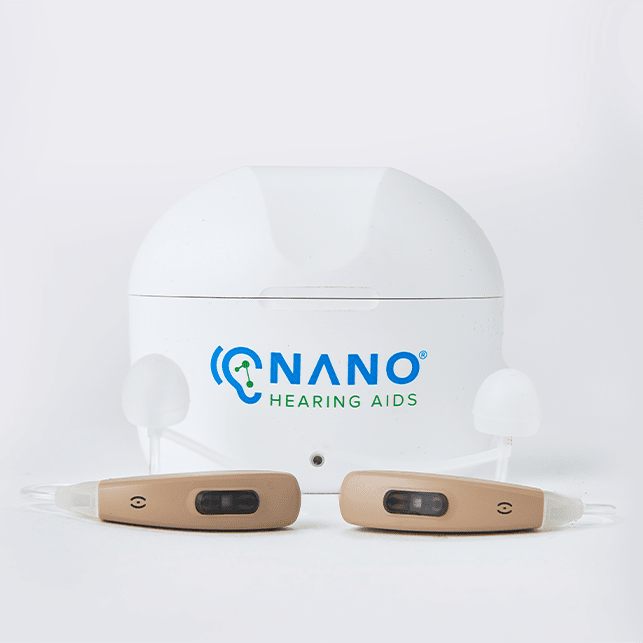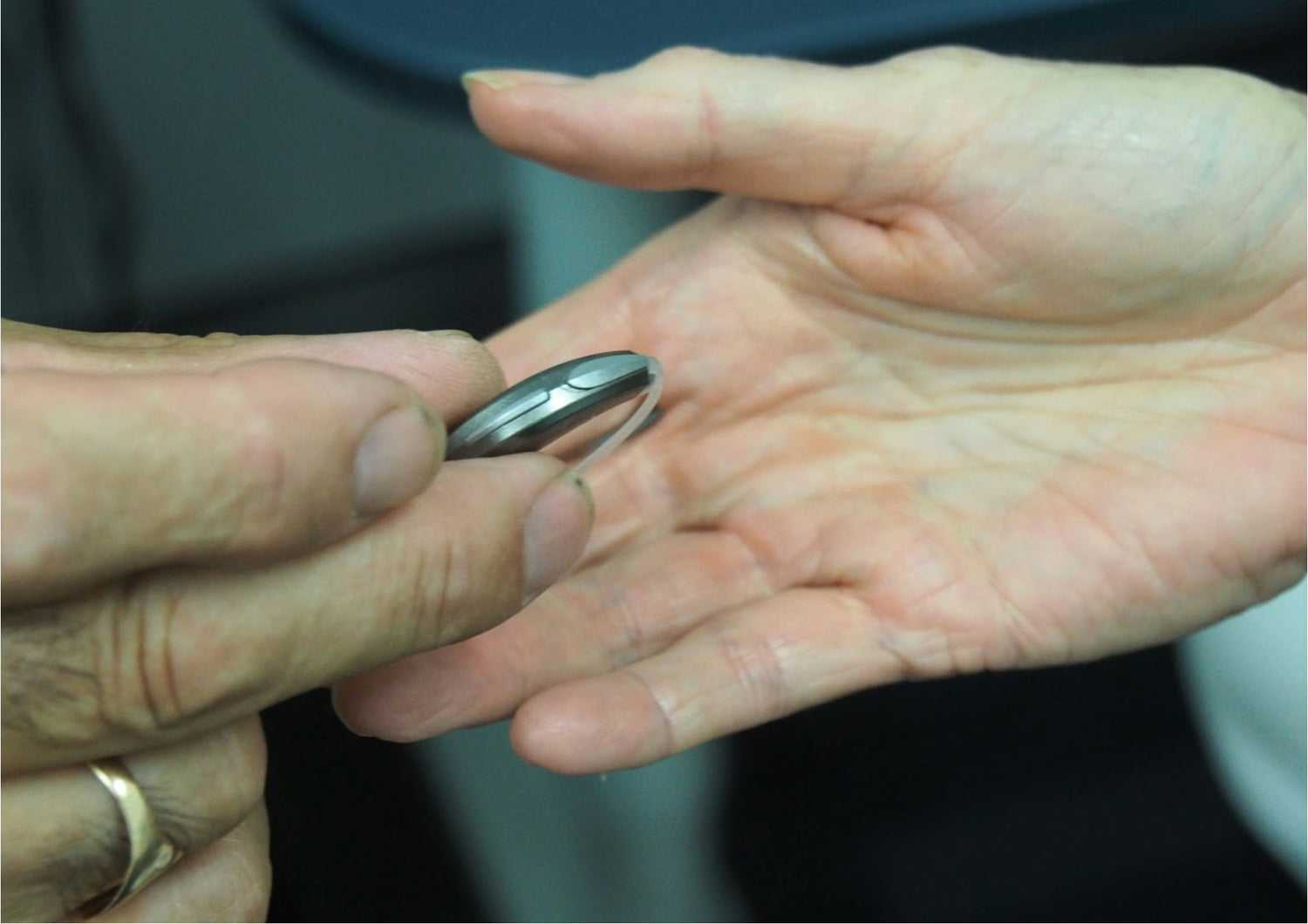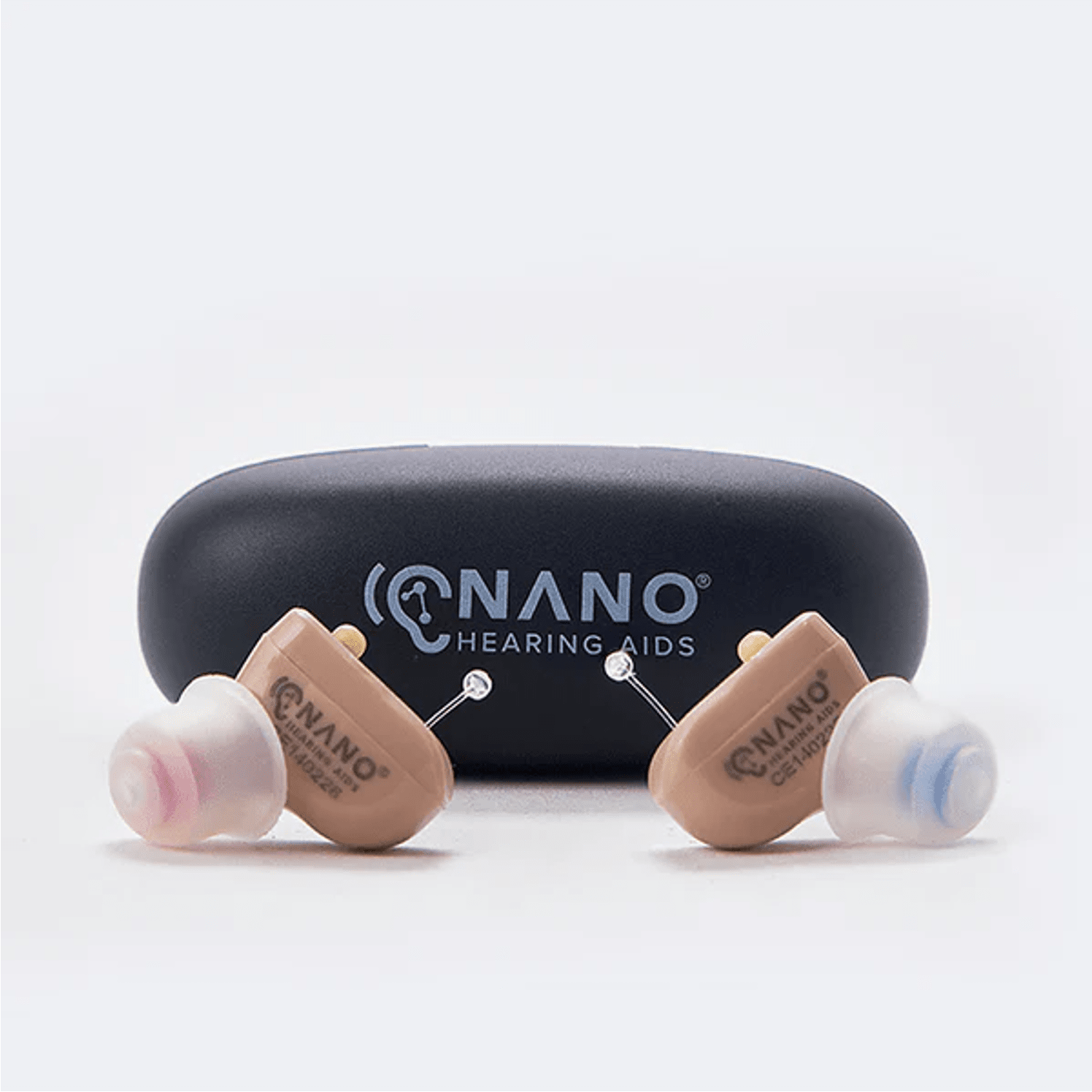Key Takeaways
- Disposable hearing aid batteries provide immediate functionality, allowing users to avoid downtime due to recharging.
- Their widespread availability ensures that users can easily find replacements when needed.
- Initial costs for hearing aids with disposable batteries are typically lower, appealing to budget-conscious individuals.
- However, frequent replacement of disposable batteries can lead to ongoing expenses and contribute to environmental waste.
- Choosing between disposable and rechargeable batteries depends on individual lifestyle, budget, and environmental considerations.
- The Nano First Ear Pro BTE model features rechargeable technology and a small portable magnetic charging case providing up to 3 charges, making it a convenient and eco-friendly alternative to disposable batteries.
NANO Hearing Aids are FDA-registered, Class I devices. Our OTC hearing aids are designed for individuals over 18 years of age with perceived mild to moderate hearing impairment. With prices starting at just $297, they offer a viable solution for those looking to improve their hearing without breaking the bank.
Why You May Want to Consider Disposable Batteries
While rechargeable hearing aids are a fantastic option for many, there are situations where disposable batteries might be more practical. For users who may not have regular access to power sources or who prefer the simplicity of not needing to recharge, disposable batteries can offer a convenient alternative.
Additionally, while rechargeable hearing aids often come with a higher initial cost, disposable batteries can be a more budget-friendly option upfront. It's all about finding the solution that best fits your lifestyle and needs.
Pros of Disposable Hearing Aid Batteries
- Immediate Functionality: Disposable batteries are ready to use straight out of the package—no need to wait for charging.
- No Need for Recharging: Ideal for those without regular access to a power source, such as during camping or traveling to remote areas.
- Widely Available and Accessible: Easily found in most pharmacies, grocery stores, and online retailers. They come in standard sizes so most will easily find the right fit for their hearing aids.
- Lower Initial Cost: Disposable batteries have a lower upfront cost, which is beneficial for those on a tight budget.
Cons of Disposable Hearing Aid Batteries
- Frequent Replacement Required: Disposable batteries may last anywhere from a few days to a couple of weeks, depending on your hearing aid model and usage. Heavy users will need to keep a steady supply to avoid interruptions.
- Ongoing Costs: While each battery may be inexpensive, the cumulative cost of regularly purchasing replacements can add up over time, with frequent users spending upwards of $150 per year on batteries.
- Environmental Impact: Disposable batteries contribute to electronic waste and have a carbon footprint due to production and disposal processes.
- Small Size and Handling Issues: The small size of disposable batteries can be challenging for those with limited dexterity or vision. Proper storage and careful handling are essential.
When to Choose Hearing Aids with Disposable Batteries
- Infrequent Hearing Aid Usage: Ideal for users who use their hearing aids occasionally—disposable batteries can be stored for long periods without losing effectiveness, unlike rechargeable batteries.
- Lack of Access to Reliable Charging Sources: Disposable batteries are a reliable alternative for those who frequently travel to remote areas or camp—no need to find a power outlet or carry a charger.
- Budgetary Constraints: Lower initial cost compared to rechargeable options, making them a practical choice for those on a tight budget (though long-term battery costs will add up).
Alternative: Rechargeable Hearing Aid Batteries
Convenience at your fingertips - rechargeable hearing aids offer a convenient solution.
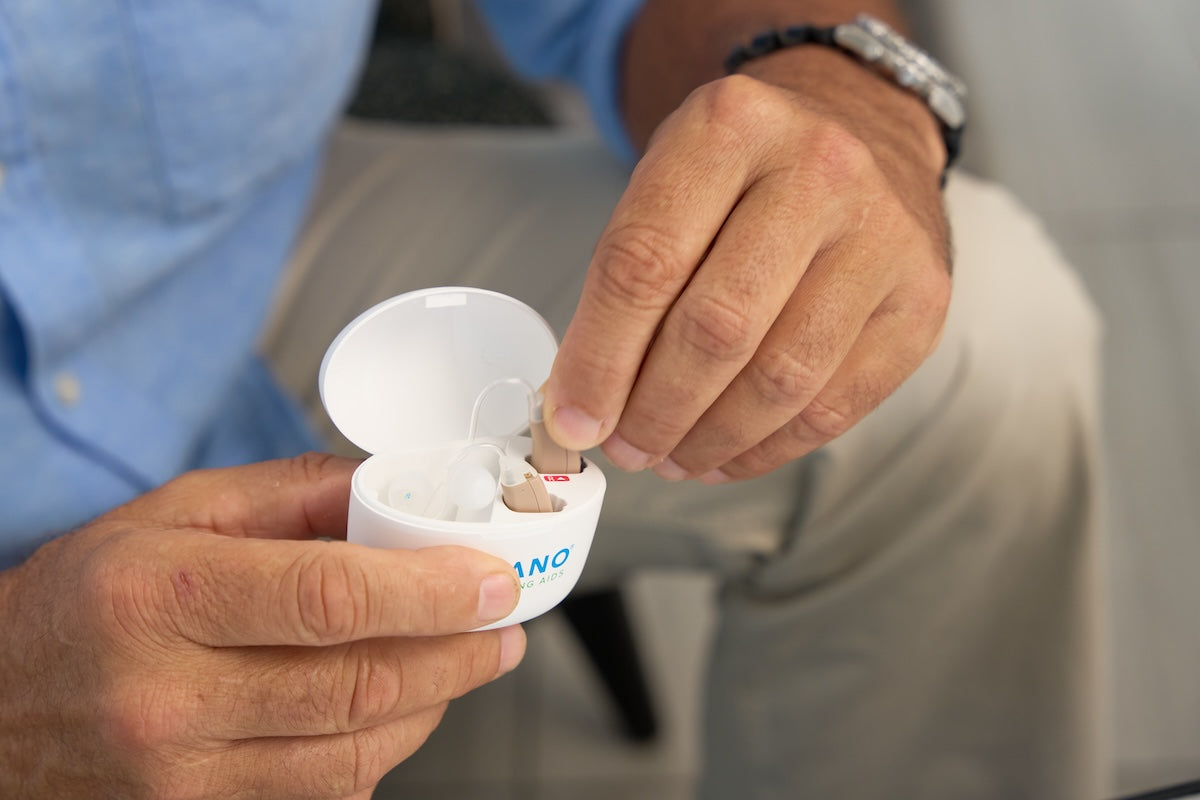
- Convenience and Ease of Use: Rechargeable batteries eliminate the need for frequent replacements—just recharge overnight, and your hearing aids are ready the next day. Ideal for busy lifestyles or those who find handling small batteries difficult.
- Environmental Sustainability: Rechargeable batteries reduce waste and lower your environmental footprint—a key benefit for eco-conscious consumers.
- Long-Term Cost Effectiveness: Though they have a higher initial cost, rechargeable batteries can save money over time by eliminating the need for continuous battery purchases.
Considerations and Limitations: Rechargeable hearing aids, such as the NANO First Ear Pro BTE, require regular access to a power source. With up to 20 hours of use per charge, they offer reliable performance throughout the day.
Why Choose Nano OTC Hearing Aids
Nano First Ear Pro BTE with rechargeable features - perfect for those seeking discreet and powerful hearing aids.
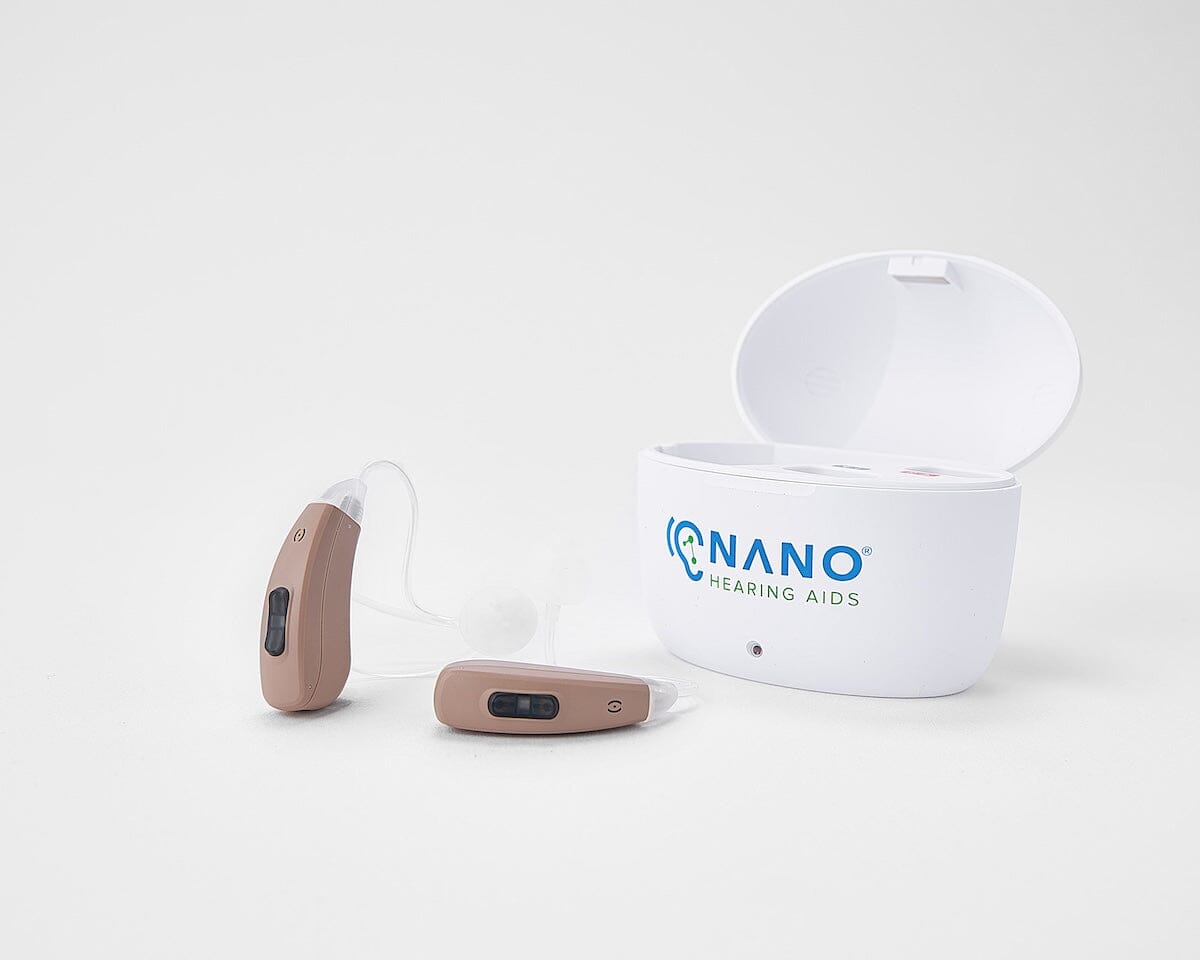
At Nano, we’re committed to helping our users enjoy better hearing with our innovative and reliable OTC solutions. With seven years of experience in the industry, we have developed a reputation for quality and customer-focused design.
Our Nano First Ear Pro BTE model is a prime example, offering up to 20 hours of use per charge. This model is equipped with an omnidirectional microphone, noise reduction technology, and feedback management so that you can enjoy clear and comfortable hearing throughout the day.
Frequently Asked Questions (FAQ)
How often do disposable hearing aid batteries need to be replaced?
Disposable hearing aid batteries typically need to be replaced every 3 to 7 days, depending on the battery size and hearing aid usage. Make sure you monitor your battery levels and have replacements on hand to avoid interruptions in your hearing aid's functionality.
Are there any health risks associated with disposable batteries?
While disposable hearing aid batteries are generally safe, it's important to handle them with care. If you have children or pets, store the batteries in a secure place to prevent accidental ingestion.
How do I properly dispose of used hearing aid batteries?
Many communities have battery recycling programs where you can drop off used batteries. Check with your local waste management facility for proper disposal guidelines.
Do disposable batteries work in all types of hearing aids?
Disposable batteries are available in various sizes to fit different hearing aid models. However, it's important to check that you’re using the correct battery size for your specific hearing aid. Refer to your hearing aid's user manual or consult with your audiologist to find the right battery size.
Why Should I Choose Nano Hearing Aids?
Choosing Nano OTC Hearing Aids means opting for a solution that balances cutting-edge technology with user-friendly design.
If you prefer the simplicity of disposable batteries or the long-term benefits of rechargeable options, Nano offers the versatility to meet your specific hearing needs. Our friendly support team is always ready to help you find the best OTC hearing aids for your needs - get in touch today!

